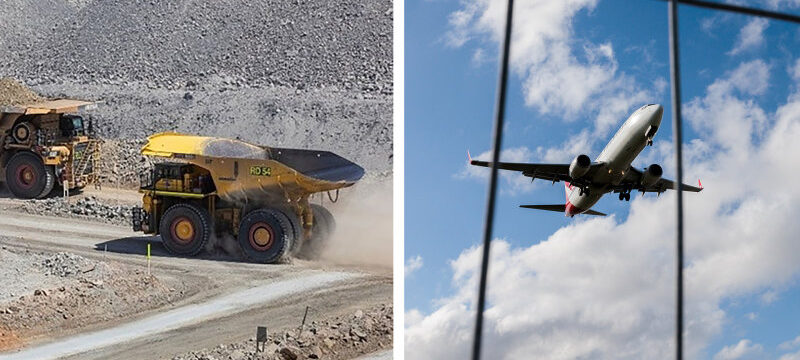Save articles for later
Add articles to your saved list and come back to them any time.
Mining giants including Rio Tinto and BHP were the biggest corporate taxpayers in 2021-22, paying a fifth of all company tax paid by large companies as they raked bumper profits from booming commodity exports, new figures show.
But at the other end of the spectrum, pandemic-affected businesses including Qantas, Virgin and Crown Resorts paid no corporate tax as they posted big losses due to the lingering impacts of border closures and COVID restrictions.
The top and bottom income tax-paying companies for 2021-22 have been revealed by ATO data.
An Australian Taxation Office report shows the largest companies in the country paid a record $84 billion in income tax that financial year as business started to rebound from the earlier pandemic period of lockdowns and restrictions.
The 2021-22 tax transparency report, released on Thursday, lists all public and foreign-owned companies that reported incomes of $100 million or higher, all private Australian companies that earned $2000 or more, and what income tax those companies paid.
The list for 2021-22 included 2713 companies, a 10 per cent increase on the previous financial year and those companies paid $83.8 billion in income tax, a 22 per cent increase on the year before.
Details on company income tax for 2022-23 will not be publicly available until November next year.
The companies that paid no income tax
Of the 2713 companies in the report, 31 per cent, or 841, did not pay any income tax.
ATO deputy commissioner Rebecca Saint said it was important to remember that tax is paid on profit, not total income.
“There can be many legitimate reasons why companies pay no tax. For example, they may not have made a profit for the year notwithstanding they have large gross income streams,” she said.
Qantas reported a total income of $9.3 billion, and Virgin Australia brought in $2.3 billion, but neither paid income tax in 2021-22.
Airline profits were eroded by COVID-19 border closures and the slow re-start of the industry in the 2022 financial year. Qantas reported a $1.9 billion loss but managed to narrow its $7 billion in debt to $4 billion due to a 54 per cent jump in revenue on the year prior.
The airline achieved just 30 per cent of its pre-pandemic flying over the 2022 financial year across its domestic and international arms.
Virgin Australia reported $387 million in losses in 2022, up from $76.8 million in losses for the year prior. Virgin’s 2021 result was buoyed by its $3.5 billion sale to Bain Capital after it was forced into administration during the onset of COVID-19.
Australia’s casino giants also paid no income tax as COVID-19 lockdowns and expensive regulatory hurdles wiped out their profits for a second consecutive year. Crown Resorts reported $2.25 billion in income, and The Star Entertainment Group reported $1.5 billion in income.
Star posted a $198.6 million loss for the 2022 financial year and wrote down the value of its flagship Sydney casino, while Blackstone-owned Crown Resorts reported a $1 billion loss.
A Crown spokesperson said the company continues to pay gaming and property taxes and other levies due to its Victorian, West Australian and NSW operations.
“In the ATO reporting period, Crown was significantly impacted by COVID-19, particularly in the first half of the year. This and other regulatory matters resulted in net losses for both financial reporting and tax purposes,” the spokesperson said.
Singapore Telecom, which owns Optus, recorded $8 billion in total revenue but no taxable income.
The report’s figures are top-level, the ATO warned, and do not show the complexity of the tax system, the relationships between company subsidiaries, what calculations went into the figures, or whether the ATO undertook any compliance activity.
Saint said the tax avoidance taskforce actively investigates companies that pay low or no income tax to make sure their reported losses are genuine and not part of some form of tax avoidance arrangement.
“There are still some taxpayers in this population that seem to not be getting the message, and so we will be relentless in attacking their tax avoidance arrangements,” she said.
Mining boom delivers majority of income tax
A surge in commodity prices – particularly iron ore, coal and oil – due to the Russian invasion of Ukraine in early 2022 helped deliver more than 50 per cent of the total $83.8 billion in corporate income tax in 2021-22.
“Much of the growth came from the mining sector off the back of those strong commodity prices as well as export volumes, contributing more than $42 billion in tax,” Saint said.
Together, BHP ($9.5 billion) and Rio Tinto ($9.1 billion) contributed 22 per cent to the total company tax paid by large companies in 2021-22.
Tania Constable, chief executive of the Minerals Council, said the huge income tax payments from the minerals industry did not merely come off the back of profits from higher commodity prices.
“While other sectors are starting to contribute more tax, having emerged from development and construction phases, the minerals sector’s contributions have been unwavering and enduring,” she said.
Those other sectors are oil and gas, which have started paying income tax and in 2023 became some of the largest corporate taxpayers thanks in part to compliance work by the ATO.
Australia’s big four banks – Commonwealth, Westpac, NAB and ANZ – were also among the top 10 corporate taxpayers for 2021-22, contributing a combined $8.4 billion or 10 per cent of the total income tax paid by large entities.
Cut through the noise of federal politics with news, views and expert analysis from Jacqueline Maley. Subscribers can sign up to our weekly Inside Politics newsletter here.
Most Viewed in Politics
From our partners
Source: Read Full Article

